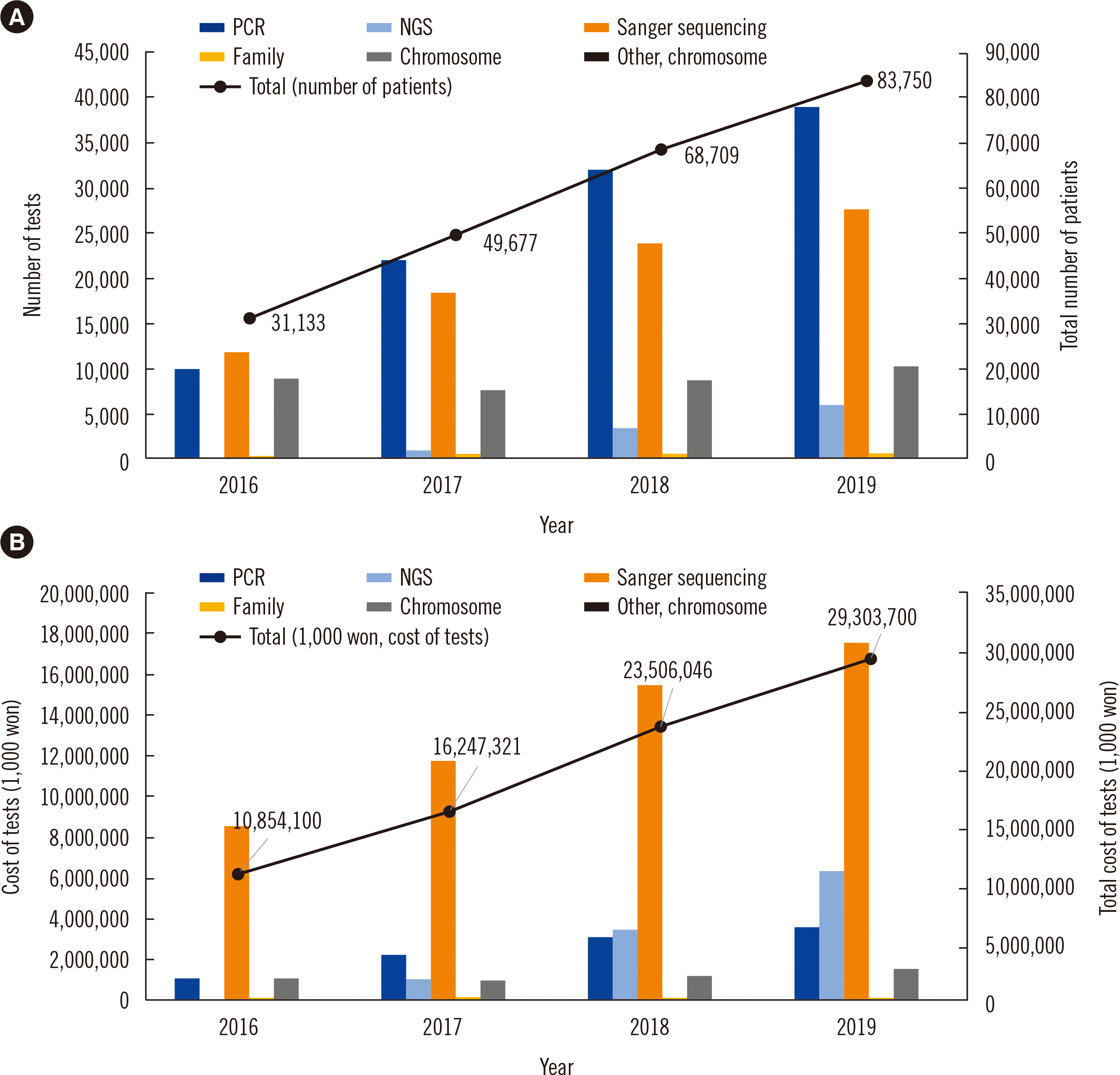1. Kim J, Kong SY, Han SH, Kim JW, Jeon CH, Yoo J. 2020; Genetic counseling status and perspectives based on a 2018 professional survey in Korea. Ann Lab Med. 40:232–7. DOI:
10.3343/alm.2020.40.3.232. PMID:
31858763. PMCID:
PMC6933060.

2. Arora NS, Davis JK, Kirby C, McGuire AL, Green RC, Blumenthal-Barby JS, et al. 2016; Communication challenges for nongeneticist physicians relaying clinical genomic results. Per Med. 14:423–31. DOI:
10.2217/pme-2017-0008. PMID:
29181085. PMCID:
PMC5696619.

4. Vears DF, Sénécal K, Borry P. 2020; Genetic health professionals' experiences returning results from diagnostic genomic sequencing to patients. J Genet Couns. 29:807–15. DOI:
10.1002/jgc4.1209. PMID:
31856387.

5. Mikat-Stevens NA, Larson IA, Tarini BA. 2015; Primary-care providers' perceived barriers to integration of genetics services: a systematic review of the literature. Genet Med. 17:169–76. DOI:
10.1038/gim.2014.101. PMID:
25210938.

6. Douma KFL, Smets EM, Allain DC. 2016; Non-genetic health professionals' attitude towards, knowledge of and skills in discussing and ordering genetic testing for hereditary cancer. Fam Cancer. 15:341–50. DOI:
10.1007/s10689-015-9852-6. PMID:
26590592. PMCID:
PMC4803807.

7. Mathias PC, Conta JH, Konnick EQ, Sternen DL, Stasi SM, Cole BL, et al. 2016; Preventing genetic testing order errors with a laboratory utilization management program. Am J Clin Pathol. 146:221–6. DOI:
10.1093/ajcp/aqw105. PMID:
27473740.

9. Ferrier RA, Connolly-Wilson M, Fitzpatrick J, Grewal S, Robb L, Rutberg J, et al. 2013; The establishment of core competencies for Canadian genetic counsellors: validation of practice based competencies. J Genet Couns. 22:690–706. DOI:
10.1007/s10897-013-9651-x. PMID:
24030735.

10. Abacan M, Alsubaie L, Barlow-Stewart K, Caanen B, Cordier C, Courtney E, et al. 2019; The global state of the genetic counseling profession. Eur J Hum Genet. 27:183–97. DOI:
10.1038/s41431-018-0252-x. PMID:
30291341. PMCID:
PMC6336871.

11. Unim B, Pitini E, Lagerberg T, Adamo G, De Vito C, Marzuillo C, et al. 2019; Current genetic service delivery models for the provision of genetic testing in Europe: A systematic review of the literature. Front Genet. 10:552. DOI:
10.3389/fgene.2019.00552. PMID:
31275354. PMCID:
PMC6593087.

12. Lee CH, Lim H, Kim Y, Yoon S, Park YS, Kim SA, et al. 2017; Analysis of new patient's willingness to pay additional costs for securing satisfactory consultation time. Health Policy Manag. 27:39–46.
13. Resta R, Biesecker BB, Bennett RL, Blum S, Hahn SE, et al. National Society of Genetic Counselors' Definition Task Force. 2006; A new definition of Genetic Counseling: National Society of Genetic Counselors' Task Force report: National Society of Genetic Counselors' Task Force report. J Genet Couns. 15:77–83. DOI:
10.1007/s10897-005-9014-3. PMID:
16761103.

16. Sahhar MA, Young M-A, Sheffield LJ, Aitken M. 2005; Educating genetic counselors in Australia: developing an international perspective. J Genet Couns. 14:283–94. DOI:
10.1007/s10897-005-0572-1. PMID:
16047091.

17. Middleton A, Mendes Á, Benjamin CM, Howard HC. 2017; Direct-to-consumer genetic testing: where and how does genetic counseling fit? Per Med. 14:249–57. DOI:
10.2217/pme-2017-0001. PMID:
29767582.

18. Liehr T, Carreira IM, Aktas D, Bakker E, Rodríguez de Alba M, Coviello DA, et al. 2017; European registration process for clinical laboratory geneticists in genetic healthcare. Eur J Hum Genet. 25:515–9. DOI:
10.1038/ejhg.2017.25. PMID:
28272535. PMCID:
PMC5437904.

19. Choi JY, Kim HJ. 2009; A study on genetic counseling curriculum, accreditation of the training program, and the certification process of genetic counselors in Korea. J Genet Med. 6:38–55.
20. Lee J, Cho HJ, Yoo HW, Park SK, Yang JJ, Kim SW, et al. 2013; The effects of a genetic counseling educational program on hereditary breast cancer for Korean healthcare providers. J Breast Cancer. 16:335–41. DOI:
10.4048/jbc.2013.16.3.335. PMID:
24155764. PMCID:
PMC3800731.

21. Skirton H. 2017; The European Board of Medical Genetics: development of a professional registration system in Europe. Eur J Hum Genet. 25:S51–2. DOI:
10.1038/ejhg.2017.158. PMID:
29297876. PMCID:
PMC5763266.

22. Godard B, Kääriäinen H, Kristoffersson U, Tranebjaerg L, Coviello D, Aymé S. 2003; Provision of genetic services in Europe: current practices and issues. Eur J Hum Genet. 11(S2):S13–48. DOI:
10.1038/sj.ejhg.5201111. PMID:
14718937.






 PDF
PDF Citation
Citation Print
Print



 XML Download
XML Download